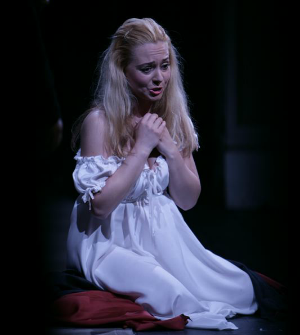It was the opera ‘they tried to ban’. Verdi’s work, based upon the play Le roi s’amue by Victor Hugo and with an Italian libretto written by Fransesco Maria Piave, caused no short amount of outrage when it originally premiered. Thankfully, it has survived to become regarded as the first of Verdi’s operatic masterpieces.
Rigoletto tells of the hunch-backed court jester Rigoletto. In an opening scene which shows the hedonistic lifestyle of the jester’s master the Duke of Mantua, the Duke is busy telling of his disbelief in monogamy whilst paying no short amount of attention to all the ladies at one of one his infamous parties, where takes pleasure in seducing Count Monterone’s daughter. Not one to hold his tongue, Rigoletto mocks the husbands of the various conquests and also Count Monderone who is arrested on the orders of Mantua and issues a curse on both the Duke and Rigoletto. This sets about a series of events which sees Rigoletto’s daughter Gilda fall in love with the Duke, whose identity she does not know; Gilda soon finds herself kidnapped by the gentlemen of the Court who Rigoletto has mocked; whilst Rigoletto vows ill-fated revenge against Mantua upon discovering his relationship with Gilda, and in true operatic fashion it is Gilda who finds herself slain.
Taking place over three acts, the Ellen Kent production of Rigoletto was a tale of contrasts – centred around the themes of love, revenge and sacrifice.
The hedonistic lifestyle of Mantua, which is immediately revealed to the audience through the near orgy taking place at the palace, is in stark contrast to the pure Gilda who doesn’t leave her home other than to attend the local church; revenge and sacrifice are also contrasted through Rigoletto’s determination to avenge his daughter who has fallen in love with Mantua but then discovers him seducing another, and Gilda’s self-sacrifice to save the one she loves.
This performance of Verdi’s Rigoletto featured performers who thoroughly did the roles justice. The sweet innocent Gilda was played to perfection by the delightful Maria Tonina, whose angelic voice was a delight to behold. Similarly Giorgio Meladze in the role of Mantua was equally convincing as the lust-filled, at times deceitful, arrogant Duke and performed the famous canzone La donna è mobile perfectly. It was a role he played with subtle menace, but also the occasional fleeting moment of vulnerability as he found himself overcome with his feelings for Gilda and his concern when she vanished. Ellen Kent stalwart Vladimir Dragos, as Rigoletto, put in an equally fine performance, portraying his character’s emotional journey through fear, anger and despair – and vocally he could not be found wanting.
Ellen Kent was also not afraid to stay true to the opera’s roots, retaining the controversial and debauched opening featuring nudity and hinting at rape. Whilst this may make some feel uncomfortable, it does to the very heart of Verdi’s masterpiece.
A typical feature of Ellen Kent’s work, the production also featured, in the opening scene, greyhound dogs and an eagle, symbolising the decadence and wealth at play.
The production was another successful piece from the ever reliable Ellen Kent and brought thunderous cheers from the audience.
You may also be interested in:
In Review: Mysterious 44 at the Halle St Peters
In Review: Olafur Arnalds at the Royal Exchange Theatre
In Review: Hamlet at the Royal Exchange Theatre



